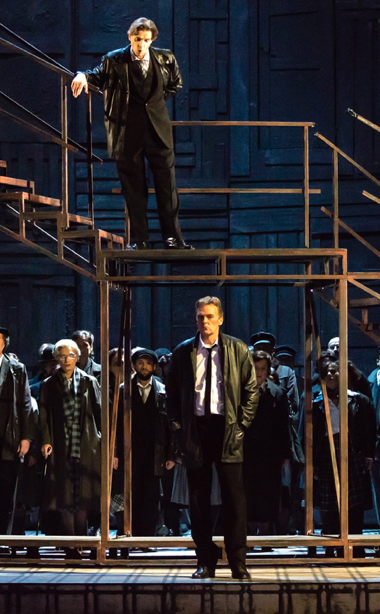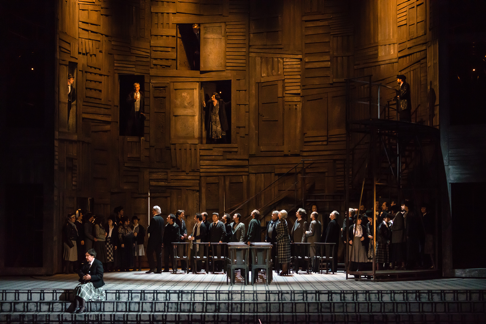
29 Jan 2015
Peter Grimes in Nice
Nice’s golden winter light is not that of England’s North Sea coast. Nonetheless the Opéra de Nice’s new production of Peter Grimes did much to take us there.
English Touring Opera are delighted to announce a season of lyric monodramas to tour nationally from October to December. The season features music for solo singer and piano by Argento, Britten, Tippett and Shostakovich with a bold and inventive approach to making opera during social distancing.
This tenth of ten Live from London concerts was in fact a recorded live performance from California. It was no less enjoyable for that, and it was also uplifting to learn that this wasn’t in fact the ‘last’ LfL event that we will be able to enjoy, courtesy of VOCES8 and their fellow vocal ensembles (more below …).
Ever since Wigmore Hall announced their superb series of autumn concerts, all streamed live and available free of charge, I’d been looking forward to this song recital by Ian Bostridge and Imogen Cooper.
The Sixteen continues its exploration of Henry Purcell’s Welcome Songs for Charles II. As with Robert King’s pioneering Purcell series begun over thirty years ago for Hyperion, Harry Christophers is recording two Welcome Songs per disc.
Although Stile Antico’s programme article for their Live from London recital introduced their selection from the many treasures of the English Renaissance in the context of the theological debates and upheavals of the Tudor and Elizabethan years, their performance was more evocative of private chamber music than of public liturgy.
In February this year, Albanian soprano Ermonela Jaho made a highly lauded debut recital at Wigmore Hall - a concert which both celebrated Opera Rara’s 50th anniversary and honoured the career of the Italian soprano Rosina Storchio (1872-1945), the star of verismo who created the title roles in Leoncavallo’s La bohème and Zazà, Mascagni’s Lodoletta and Puccini’s Madama Butterfly.
Evidently, face masks don’t stifle appreciative “Bravo!”s. And, reducing audience numbers doesn’t lower the volume of such acclamations. For, the audience at Wigmore Hall gave soprano Elizabeth Llewellyn and pianist Simon Lepper a greatly deserved warm reception and hearty response following this lunchtime recital of late-Romantic song.
Collapsology. Or, perhaps we should use the French word ‘Collapsologie’ because this is a transdisciplinary idea pretty much advocated by a series of French theorists - and apparently, mostly French theorists. It in essence focuses on the imminent collapse of modern society and all its layers - a series of escalating crises on a global scale: environmental, economic, geopolitical, governmental; the list is extensive.
For this week’s Live from London vocal recital we moved from the home of VOCES8, St Anne and St Agnes in the City of London, to Kings Place, where The Sixteen - who have been associate artists at the venue for some time - presented a programme of music and words bound together by the theme of ‘reflection’.
'Such is your divine Disposation that both you excellently understand, and royally entertaine the Exercise of Musicke.’
Amongst an avalanche of new Mahler recordings appearing at the moment (Das Lied von der Erde seems to be the most favoured, with three) this 1991 Mahler Second from the 2nd Kassel MahlerFest is one of the more interesting releases.
‘And there was war in heaven: Michael and his angels fought against the dragon; and the dragon fought and his angels, And prevailed not; neither was their place found any more in heaven … that old serpent … Satan, which deceiveth the whole world: he was cast out into the earth, and his angels were cast out with him.’
If there is one myth, it seems believed by some people today, that probably needs shattering it is that post-war recordings or performances of Wagner operas were always of exceptional quality. This 1949 Hamburg Tristan und Isolde is one of those recordings - though quite who is to blame for its many problems takes quite some unearthing.
There was never any doubt that the fifth of the twelve Met Stars Live in Concert broadcasts was going to be a palpably intense and vivid event, as well as a musically stunning and theatrically enervating experience.
‘Love’ was the theme for this Live from London performance by Apollo5. Given the complexity and diversity of that human emotion, and Apollo5’s reputation for versatility and diverse repertoire, ranging from Renaissance choral music to jazz, from contemporary classical works to popular song, it was no surprise that their programme spanned 500 years and several musical styles.
The Academy of St Martin in the Fields have titled their autumn series of eight concerts - which are taking place at 5pm and 7.30pm on two Saturdays each month at their home venue in Trafalgar Square, and being filmed for streaming the following Thursday - ‘re:connect’.
The London Symphony Orchestra opened their Autumn 2020 season with a homage to Oliver Knussen, who died at the age of 66 in July 2018. The programme traced a national musical lineage through the twentieth century, from Britten to Knussen, on to Mark-Anthony Turnage, and entwining the LSO and Rattle too.
With the Live from London digital vocal festival entering the second half of the series, the festival’s host, VOCES8, returned to their home at St Annes and St Agnes in the City of London to present a sequence of ‘Choral Dances’ - vocal music inspired by dance, embracing diverse genres from the Renaissance madrigal to swing jazz.
Just a few unison string wriggles from the opening of Mozart’s overture to Le nozze di Figaro are enough to make any opera-lover perch on the edge of their seat, in excited anticipation of the drama in music to come, so there could be no other curtain-raiser for this Gala Concert at the Royal Opera House, the latest instalment from ‘their House’ to ‘our houses’.
"Before the ending of the day, creator of all things, we pray that, with your accustomed mercy, you may watch over us."

Nice’s golden winter light is not that of England’s North Sea coast. Nonetheless the Opéra de Nice’s new production of Peter Grimes did much to take us there.
A new production of Peter Grimes is always news, in fact any production of this first Britten operatic masterpiece beckons travel from afar. Nice Opera artistic director (since 2012) Marc Adam was the metteur en scène for this new production for which he has collaborated with born-in-Algiers, raised-in-Nice, Juilliard School trained conductor Bruno Ferrandis. Mr. Adam previously collaborated with Mo. Ferrandis for a Wozzeck (Gurlitt) at the Opera de Rouen in 1997.
Much of Bruno Ferrandis’s career has transpired in Canada and the U.S. He is currently the music director of the Santa Rosa (California) Symphony.
Mr. Adam assembled an excellent cast. English tenor Johyn Graham Hall as Peter Grimes possesses an appropriate voice for Britten heros, not the dramatic tenor often associated with Grimes, but the lighter, character voice that characterizes the Aschenbach of Death in Venice, another of Mr. Hall’s Britten roles. Mr. Hall has an affecting presence and the vocal stamina to have seen the role through this production’s expressionist requirements.
 Fabienne Jost as Ellen (left lower corner)
Fabienne Jost as Ellen (left lower corner)
French soprano Fabienne Jost sang Ellen. An ensemble singer at the Berne Opera and previously at German theaters, she offered a purity of voice and a musicality supported by fine technique that made this Ellen very pleasurable, in fact memorable.
Swallow was effectively portrayed by Marseille born, veteran bass-baritone André Cognet. French baritone Vincent Le Texier did not find the humanity of, or any softness for Balstrode, often barking his lines rather than singing. We were left unfulfilled by his character. Among the well cast smaller roles Marseille born tenor Edward Mout was especially effective as Bob Boles, all these rustic characters linguistically colored by carefully produced English sounds.
Among the more effective moments of the production were the black and white projections on the scrim covered proscenium that occurred during Peter Grimes’ famous orchestral sea interludes (of course Britten purists would have preferred no visual distraction from the sounds of these magnificent pieces). At times the images were the boiling sea, as well there were affective moments when the costumed actors were seen in pantomime through the foggy images. Puzzling however was the ascent to Grime’s cottage, rendered in images of industrial steel construction (the back side of the semicircular set unit was Grimes' hut).
Set design was entrusted to Roy Spahn who works primarily in German theaters. It was a strange semicircular multi-level abstraction of windows placed on a revolving stage. Installation of the revolving stage evidently necessitated a raised stage platform (about 60 cm [2‘] high) that was faced with incongruous black and white squares that looked a bit like Halloween decorations. The floor of the stage was not visible from the seats in the orchestra.
A further complication of the raised platform was the necessity to raise the conductor’s podium to give him view of the stage. This seemed to separate the maestro from his orchestra with the resulting impression that the orchestra was at adrift and rudderless, eviscerating the complex, ambiguous, sensual, cruel, tender, passive musico-dramatic world that is genius of Benjamin Britten. From time to time the maestro did take his eyes off the stage and engage the orchestra. These moments supplied brief impressions that the Orchestre Philharmonique de Nice was capable of creating the magic of the Britten score when asked.
It was perhaps an artistic choice of the director and conductor to strip the opera of its colors, moods and ambiguities, and focus the drama on the words and outward behavior of its actors. While this did create a theatrical atmosphere, often of great intensity, it stripped the opera of its emotional focus, rendering its protagonist as mentally unbalanced rather than as a complex human character adrift in a threatening natural world and outside an alien and uncomprehending human world.
Michael Milenski
Casts and production information:
Peter Grimes: John Graham Hall; Ellen Orford: Fabienne Jost; Balstrode: Vincent Le Texier; Tantine: Manuela Bress; Première nièce: Hélène Le Corre; Deuxième nièce; Anne Ellersiek; Bob Boles: Edward Mout; Swallow: André Cognet; Mrs Sedley: Sophie Fournier; Le recteur: Frédéric Diquero; Ned Keene: Bernard Imbert; Hobson: Thomas Dear. Orchestre Philharmonique de Nice; Choeur de l’Opéra de Nice. Conductor: Bruno Ferrandis; Mise en scène: Marc Adam; Décors: Roy Spahn; Costumes: Pierre Albert; Lumières: Hervé Gary; Chorégraphie: Pascale Chevreton. Opéra de Nice, January 24, 2015.